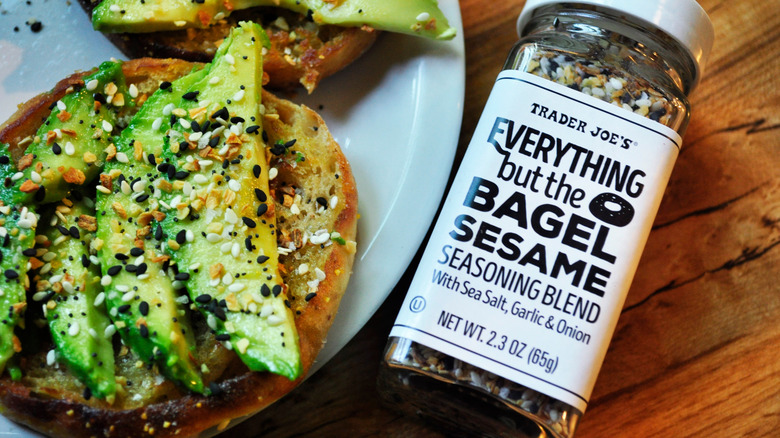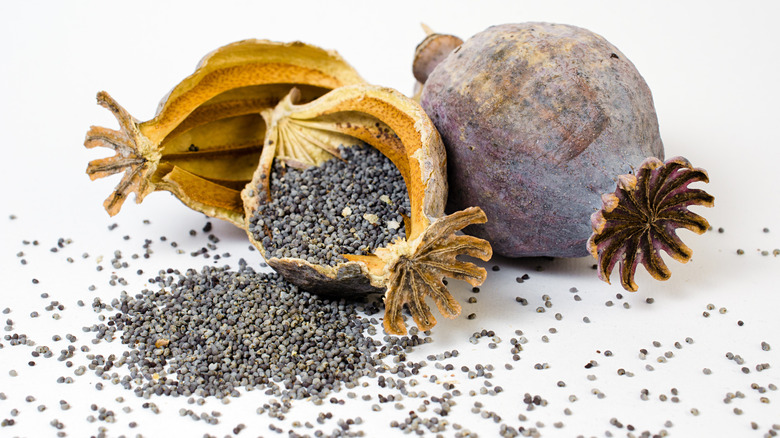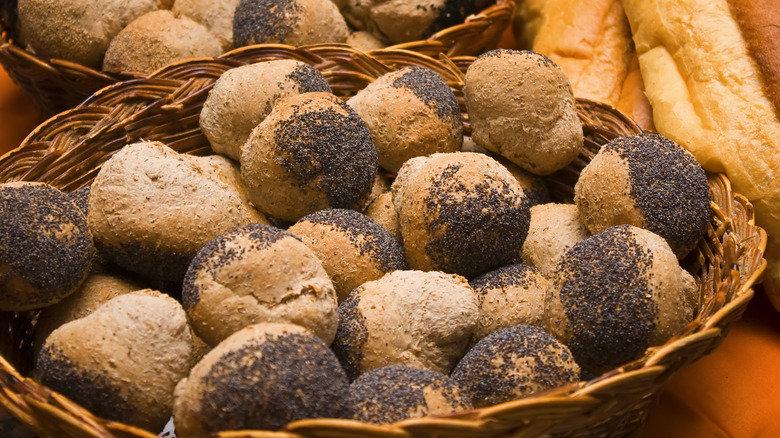Why Trader Joe's Bagel Seasoning Is Being Confiscated In South Korea
Trader Joe's is well-known for having a loyal following, carrying a number of items unique to its brand. Unfortunately, certain TJ's items are not welcome everywhere. There have recently been reports of customs crackdowns in South Korea centered around one of the grocer's beloved products — the Everything But The Bagel Sesame Seasoning Blend.
South Korean officials issued the ban back in 2022 because they feared the poppy embryos within the blend could contain trace amounts of opium. While poppy seeds are indeed harvested from the opium poppy plant, the seeds don't generally contain any meaningful quantities of narcotic material. Although the restriction has existed for some time, "Recently, the customs offices have been strengthening crackdown on narcotic related items," according to an airport spokesman (via CNN).
While the chance of even trace amounts is quite remote, especially considering the seeds are just one part of the blend, this recent move signals the government's zero-tolerance posture toward the movement of narcotics.
Are poppy seeds contaminated with narcotics?
Many will remember the episode of the 90s hit comedy series "Seinfeld" when Elaine eats a poppy seed muffin and consequently fails a drug test. This fictional scenario wasn't as far-fetched as some thought at the time. There have been numerous instances over the years where people have been flagged on a urinalysis because they consumed baked goods that contained the sweet, nutty seeds.
The contentious plant from which the seeds come, Papaver somniferum, is well-known for manufacturing opium, which contains the narcotic morphine. Piercing the seed pod of the plant releases a white liquid substance containing opium that is used to various ends, both legal and illegal. The seeds themselves, however, do not contain any of the drug. They can be contaminated during the production process, but unintentionally, as they're regularly washed before being sold.
The abundance of caution on the part of the South Korean government is likely due to the assorted regulations across countries regarding how they are commercially processed. While some have extremely strict requirements and carefully monitor production, others have a more lax approach. Without complete assurance that the minuscule black ovules won't contain some amount of opium, S. Korea will suffer your groans at customs to be safe rather than sorry.
Are poppy seeds banned elsewhere?
It's not unusual for countries to prohibit seemingly benign foods for various reasons. France, for example, banned ketchup in schools (including colleges) for anything but french fries, allegedly to protect the integrity of traditional French cuisine. In the U.S., haggis is banned for food safety reasons. The popular breakfast pastry Pop-Tarts are also banned in various countries throughout Europe. And South Korea has plenty of company in its prohibition on anything containing poppy seeds.
Singapore still hands down the death penalty for drug-trafficking offenses — including those involving cannabis. Poppy seeds are completely prohibited there and in Taiwan. Many countries in the Middle East, including Saudi Arabia and the United Arab Emirates, have outlawed the controversial ovules as well, and by extension TJ's seasoning blend. The United States doesn't ban poppy seed consumption or commercial sales, but some organizations have warned against eating them. The U.S. Department of Defense urges service members to avoid poppy seeds because it could lead to false positives on drug tests, and the U.S. Anti-Doping Agency has similarly advised athletes of the same phenomenon.
Thankfully, if you don't have to worry about passing a urine analysis anytime soon, you can still enjoy Trader Joe's Everything But The Bagel seasoning in the states on fried eggs, roasted salmon, and, of course, bagels anytime you like.


